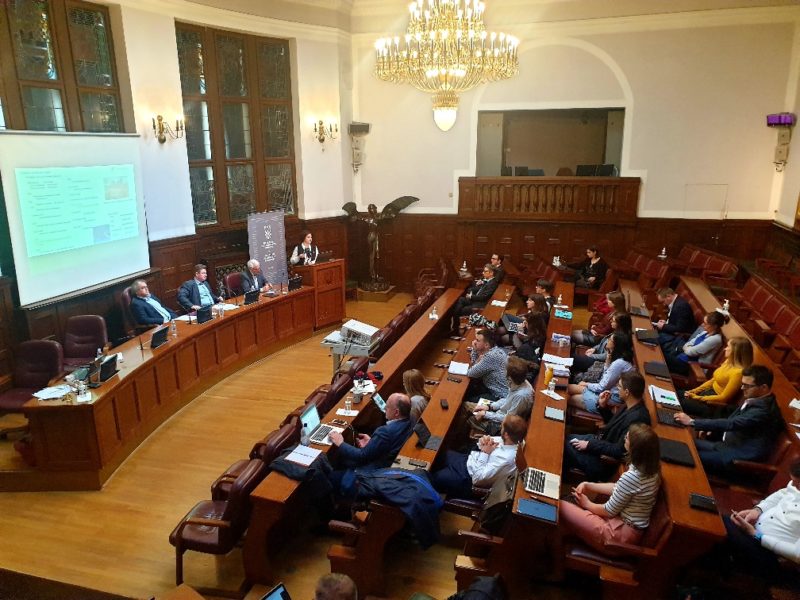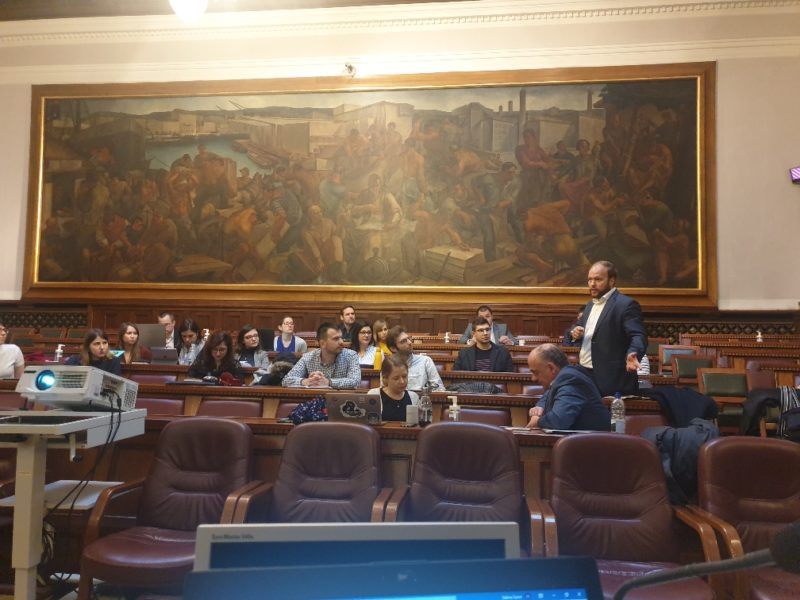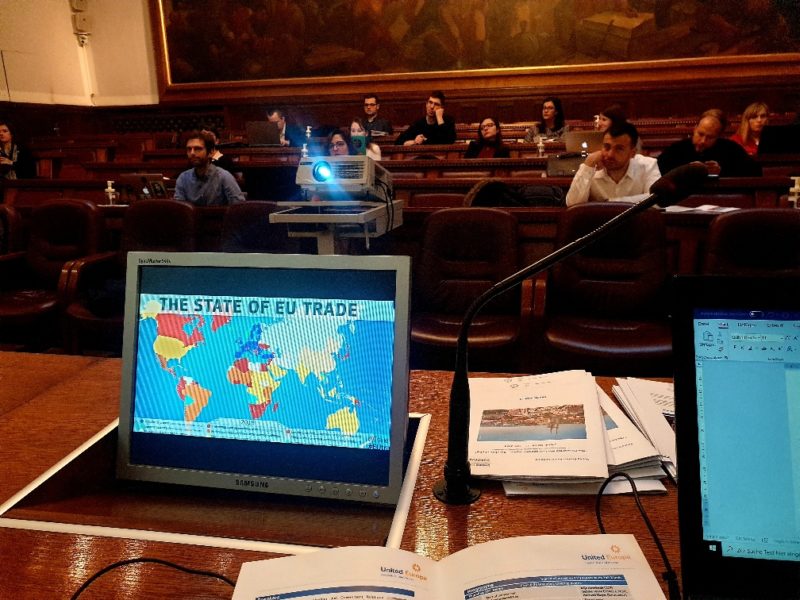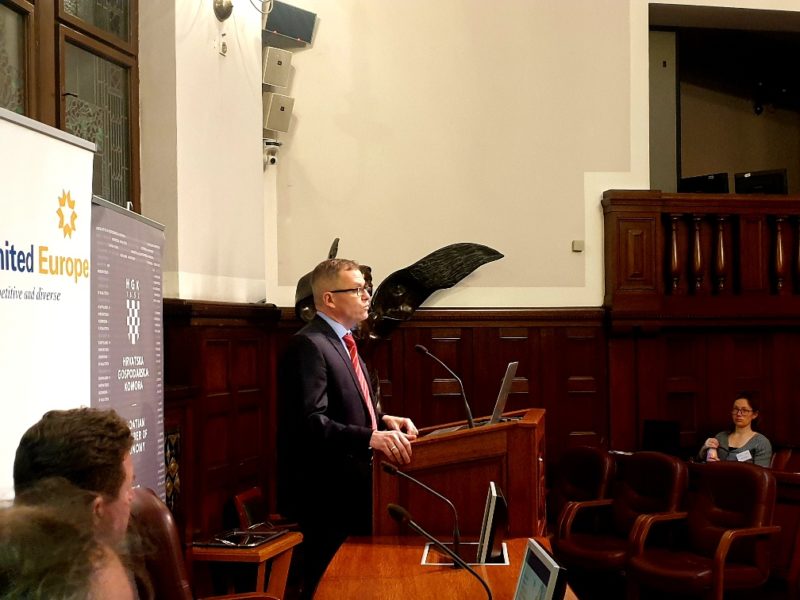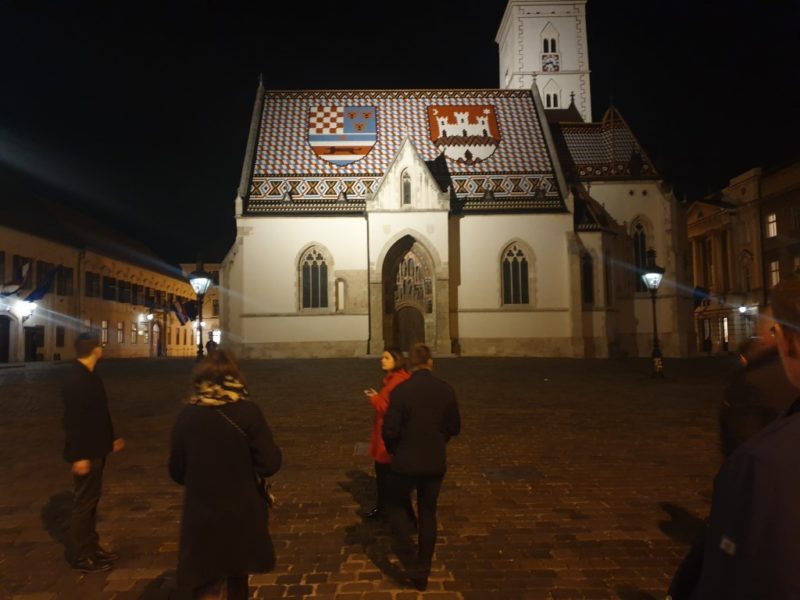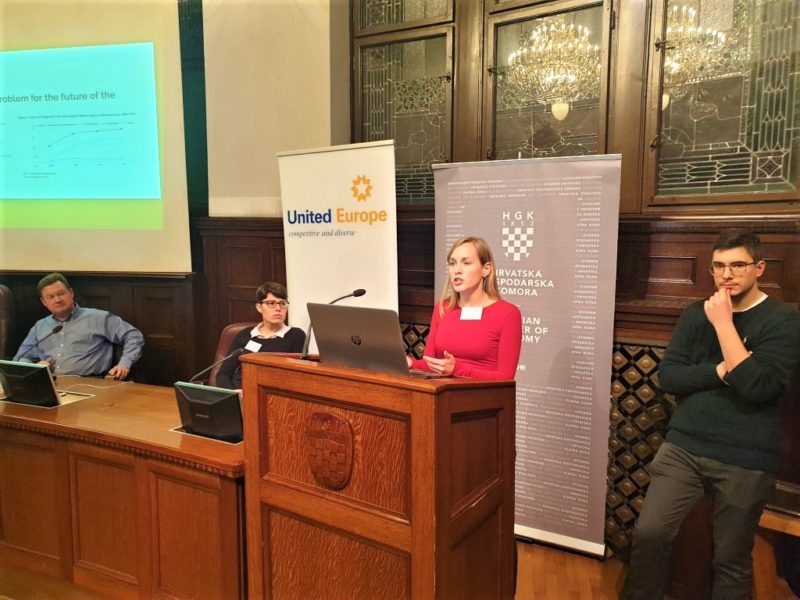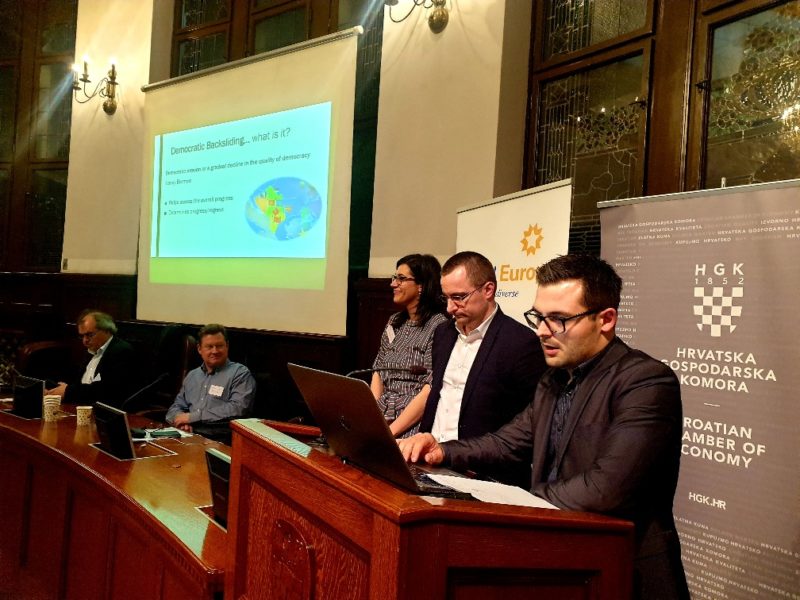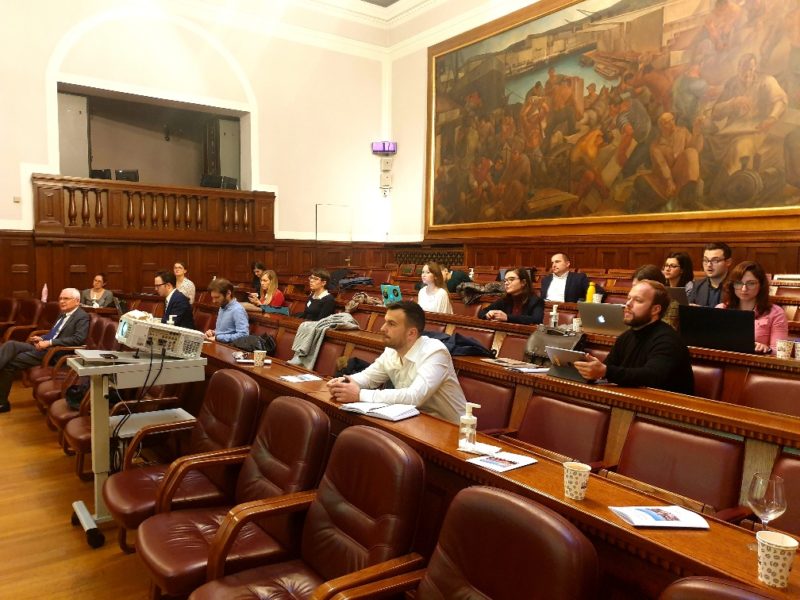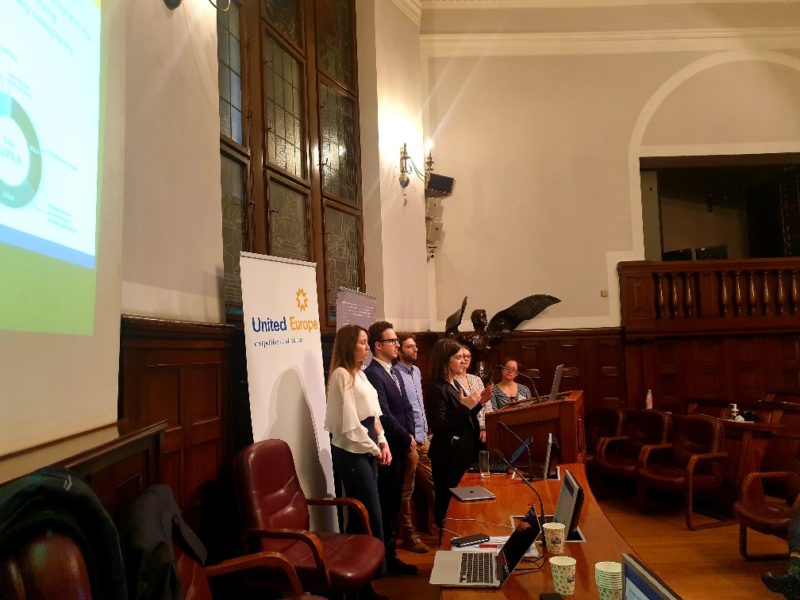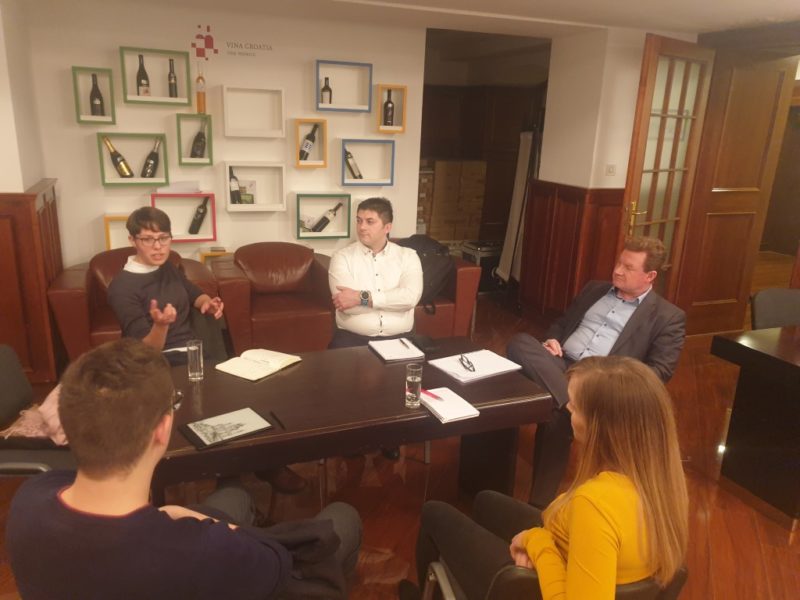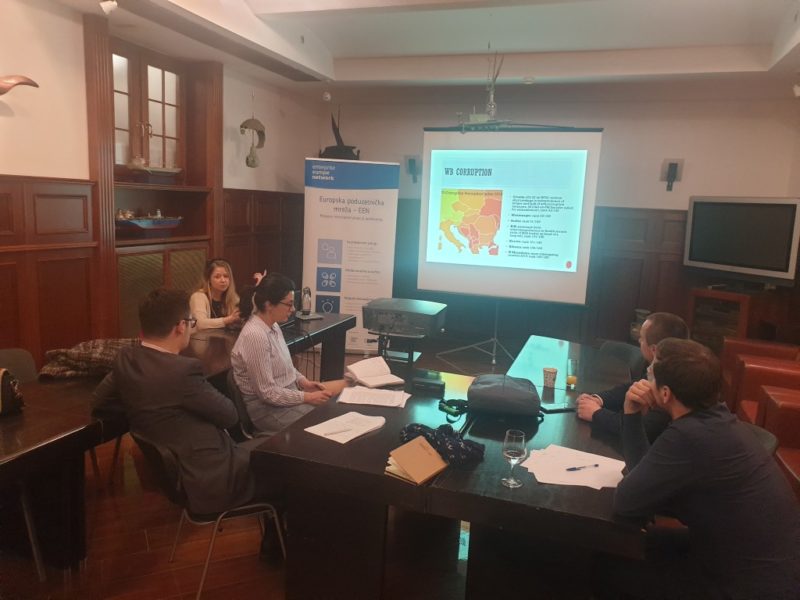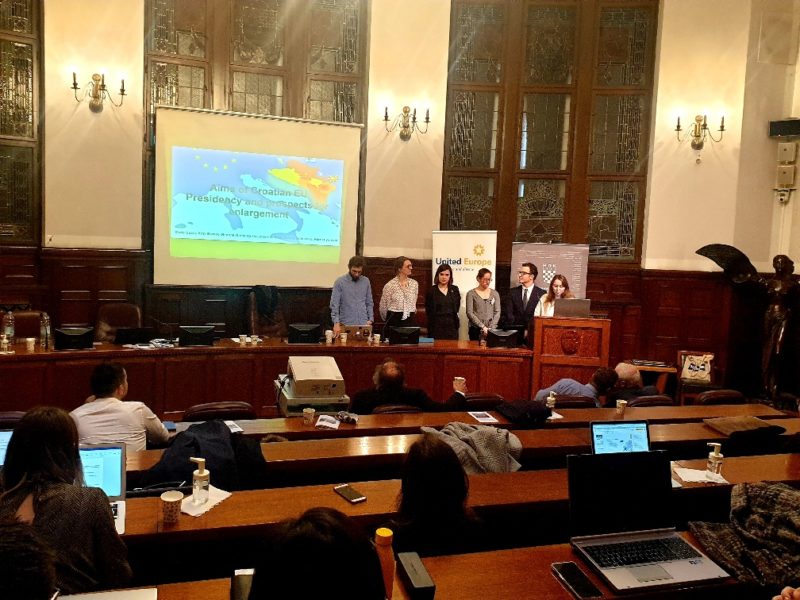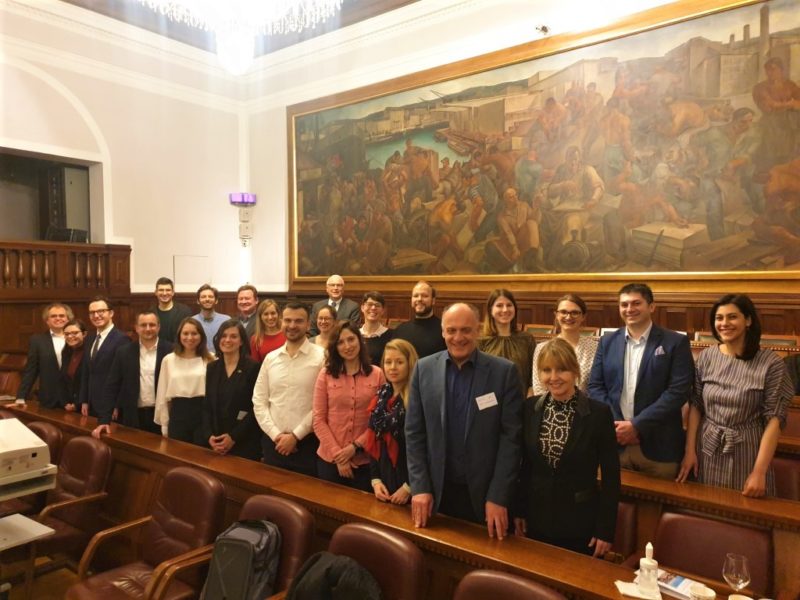In the framework of the Croatian EU Presidency, our first Young Professionals Seminar took place on 12 and 13 March on the topic “The EU and the Western Balkans region – The state of play” in Zagreb. Cooperation partner was The EUROPAEUM, a network of 17 leading European universities.
 In several groups, 19 participants from 15 countries worked on different topics such as 1) the aims of the Croatian EU Presidency, 2) corruption, democracy and media freedom in the Western Balkans, 3) the influence of China with its “Belt & Road” initiative, 4) the role of Russia in the stability of the region as well as 5) possible solutions to overcome the division and promote the integration of the Western Balkans region into the EU.
In several groups, 19 participants from 15 countries worked on different topics such as 1) the aims of the Croatian EU Presidency, 2) corruption, democracy and media freedom in the Western Balkans, 3) the influence of China with its “Belt & Road” initiative, 4) the role of Russia in the stability of the region as well as 5) possible solutions to overcome the division and promote the integration of the Western Balkans region into the EU.
The groups were led by Hartmut Mayer (Director of the EUROPAEUM, Official Fellow in Politics at St. Peter‘s College and Director of the European Studies Centre at Oxford University, board member of United Europe), Jessie Barton Hronešová (ESRC Postdoctoral Fellow at the Oxford Department of International Development), Othon Anastasakis (Director of South East European Studies at Oxford (SEESOX) & Senior Research Fellow at St Antony’s College), and Marcus Lippold (Advisor to the European Commission, guest lecturer for Energy Economics & Energy Policy, board member of United Europe).
The aim of the seminar was to provide a platform for open discussion of these topics with politically engaged young professionals from all walks of life, to propose potential solutions and a different way forward for the region’s development. This was facilitated by guiding the participants working groups through a structured series of discussions on specific topics, underpinned by so-called “impulse lectures” and plenary lectures.
During the two days the participants worked on the four following issues:
1. Croatia’s goals of its EU Presidency, and how can they be achieved;
2. The state of democracy, quality of the rule of law and civil society in the Western Balkans countries;
3. The current state of security and the role of geopolitics across the region;
4. The current socio-demographic trends across the region and how brain drain influences the current social and political dynamics.
DAY 1
The seminar was initially somewhat disrupted by the beginning of the Corona-Virus crisis. At the time, there were no formal travel restrictions or health measure recommended for Croatia. Based on such official government advice, we had decided to give the seminar a go ahead. However, as the crises unfolded day by day, several confirmed speakers and participants had to cancel their travel at short notice. Therefore, the seminar could not be opened by a representative of the Croatian government on the objectives of the EU Presidency. Also a planned response by former veteran MEP Elmar Brok could not take place. Seven out of the original 26 selected and confirmed participants had to cancel their travel at short notice.
The seminar formally opened with welcome addresses by Hartmut Mayer, Marcus Lippold and United Europe’s Managing Director Sabine Sasse.
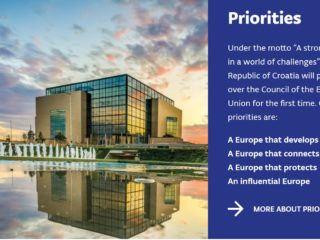 Ines Obradović, Director of the Croatian Chamber of Economy, then presented the four key elements of the Croatian Presidency, which takes place under the slogan “A strong Europe in a world of challenges”:
Ines Obradović, Director of the Croatian Chamber of Economy, then presented the four key elements of the Croatian Presidency, which takes place under the slogan “A strong Europe in a world of challenges”:
1. A Europe that develops
2. A Europe that connects
3. A Europe that protects
4. An influential Europe.
Key messages:
● Investing more money in security in order to have peace and safety in Europe.
● Europe has to improve its role and consider new ways in order to stay competitive in the global market.
● Croatia is strongly supporting EU enlargement. The EU should give Western Balkan countries the opportunity to join the EU.
● The EU should consider also Western Balkans as an excellent partner and future member of the EU. They are part of the continent and have similar goals.
● Balkan countries are also suffering from migrant crisis. “We did lose some years without solving the problems.“
(A more detailed description of Croatian’s EU Presidency can be found here.)
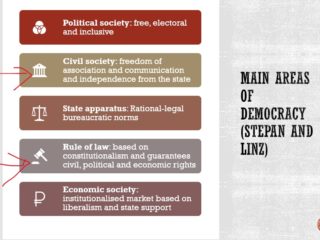 Jessie Barton Hronešová followed with a presentation about the state of democracy across the region, starting with some fundamental definitions and concepts. She stressed that different understandings of democracy result in different assessments about the current state. Standard rankings were discussed and criticised as they often simplify complex democratic realities in each individual country. She continued with a discussion about the role of the rule of law and civil society as key principles and pillars of working democracies.
Jessie Barton Hronešová followed with a presentation about the state of democracy across the region, starting with some fundamental definitions and concepts. She stressed that different understandings of democracy result in different assessments about the current state. Standard rankings were discussed and criticised as they often simplify complex democratic realities in each individual country. She continued with a discussion about the role of the rule of law and civil society as key principles and pillars of working democracies.
Marco Babić, Assistant Director of the Croatian Chamber of Economy, then gave an overview about the economy aspects of the EU Presidency which include:
● Showing Croatia’s capacity
● Proving itself as a good diplomat and a successful country
● Attracting investors to Croatia (and the whole region)
● Dealing with digitalisation, Green Deal, security and migration
● Engaging civil society into the notion of being part of it rather than export it to Brussels
● political and economic stability
In the following impulse lecture, Adriana Petrović, Regulatory Affairs consultant at the Croatian oil company INA, presented a brief overview of the structure and history of Croatia, inspired the audience by highlighting the country’s natural beauty and pointing out the most important historical events. She then explained her own experience since Croatia had joined the EU and reflected on what has changed. Among other things, she enumerated the confirmation of sovereignty and the democratic standards, the universal democratic and moral values, the freedom of movement of capital, goods as well as services and people. She also talked about her own professional challenges, and emphasized that people should never forget how it was before joining the EU and how much had changed for the better.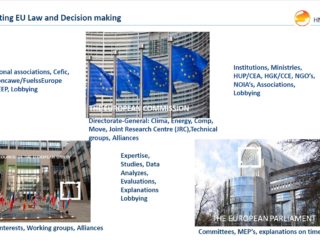
Adriana then invited the audience into her specific field of expertise, taking as a real example the adoption and enforcement of EU fuel standards for gasoline and diesel and showing how she as an expert and delegate of her country and industry could, along with other Europeans, influence policy-making through sustained and focused advice. Due to being involved in shaping EU legislation, she stressed the fact that being a member of different associations and working groups on national and EU level gives every citizen the opportunity to use their knowledge and skills for the benefit of the branch of their industry and for the common good.
In conclusion, she pointed out the advantages of EU membership for industry leaders:
– EU standardisation enabled Croatian industry to have an equal starting position
– meeting professionals and experts and exchange standpoints and opinions
– exchange of knowledge and experience
– faith in community, for a better future.
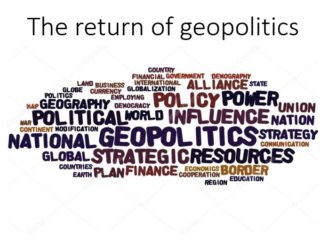 Othon Anastasakis presented his research on geopolitics in South Eastern Europe. He started by suggesting new ways of looking at geopolitics, in general, beyond the conventional competition over territories, military might, balance of powers, national borders and conventional diplomacy. He stressed that current geopolitics comprise more actors beyond states and new challenges (climate change, cybersecurity, organised crime, migration, pandemic) which transcend national borders and give new meanings to borders globally or in many cases make borders irrelevant. He then focused on South East Europe by stressing the peripheral geography of the region in Europe and its global significance as an entry point and passage to Europe for many external players. Then he discussed the role and significance of external players in the Western Balkans such as Russia, China, Turkey and the Middle East and the new challenges that the region faces in the form of military threats, radicalisation, organised crime and cybersecurity.
Othon Anastasakis presented his research on geopolitics in South Eastern Europe. He started by suggesting new ways of looking at geopolitics, in general, beyond the conventional competition over territories, military might, balance of powers, national borders and conventional diplomacy. He stressed that current geopolitics comprise more actors beyond states and new challenges (climate change, cybersecurity, organised crime, migration, pandemic) which transcend national borders and give new meanings to borders globally or in many cases make borders irrelevant. He then focused on South East Europe by stressing the peripheral geography of the region in Europe and its global significance as an entry point and passage to Europe for many external players. Then he discussed the role and significance of external players in the Western Balkans such as Russia, China, Turkey and the Middle East and the new challenges that the region faces in the form of military threats, radicalisation, organised crime and cybersecurity.
After lunch the four working groups started with lectures about their respective issue, led by Hartmut Mayer, Jessie Barton Hronesova, Othon Anastasakis and Marcus Lippold:
WG1. Prospects for EU enlargement and aims of Croatian EU Presidency;
WG2. Quality of democracy: the role of rule of law and civil society;
WG3. Security and geopolitical challenges;
WG4. Regional demographics and brain drain
After intensive group work, the day ended with a guided tour through the old city of Zagreb, which included a ride with the historical funicular and a visit of the “Museum of Broken Relationships”, and a dinner at one of Zagreb’s oldest restaurants “Stara Vura”.
DAY 2
After first short summaries of the initial themes and emerging results of the working groups, the day started with an impulse by Kiev-based Gunther Fehlinger, Secretary General of CEE BC. Fehlinger stressed that the economic crisis is leading to major distortions on the European periphery. To stabilize the region he advocates the quickest possible admission of further Eastern European countries to the EU by 2030. Non-admission would lead to major distortions in this region.
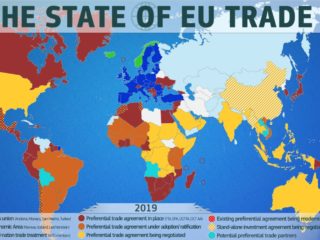 After Britain’s withdrawal from the EU, it is important to strengthen Eastern Europe and to admit countries such as Ukraine, Montenegro, Albania, Kosovo and Serbia to the EU gradually but without too much delay, Fehlinger said.
After Britain’s withdrawal from the EU, it is important to strengthen Eastern Europe and to admit countries such as Ukraine, Montenegro, Albania, Kosovo and Serbia to the EU gradually but without too much delay, Fehlinger said.
According to Fehlinger, Russia, not least through its occupation of the Crimea, is pursuing a deliberate strategy of undermining European integration. In order to deepen the European unification process, the EU must be enlarged to achieve mutual reinforcement. The answer to Brexit could only be to expand the EU, NATO, the Euro, OECD, WTO, OSCE and RCC to the East.
By 2028, the accession processes for Montenegro, North Macedonia, Albania, Bosnia & Herzegovina, the Republic of Kosovo, Serbia, Ukraine, Georgia and, most recently, Moldova should be completed in various stages, provided they all join NATO before. It would be better to give these countries an early prospect of joining the EU than to leave them to themselves or to Russia and China. It would already be evident that these countries are stepping up their fight against corruption and reforming their systems to meet the admission criteria. If the countries were not admitted to the EU, people would leave their countries in even greater numbers due to lack of prospects and would try to enter the EU. That is why Fehlinger recommends that the enlargement of the EU with then 37 members should be completed by 2028 and to strive further deepening of the EU. “The answer to the corona crisis in 2020 must be more Europe”, Fehlinger said.
Provided with these information and opinions, the individual working groups started to prepare their presentations and presented them at the end of the seminar.
RESULTS (presentations of working groups):
Group 1: Aims of Croatian EU Presidency and prospects for enlargement
Participants: Katharine Barney, UK, Cody Busia, USA, Hanna Grace Carter, USA/Germany, Albert Guasch, Spain, Karina Matvienko, Russia, Hattie Watson, UK
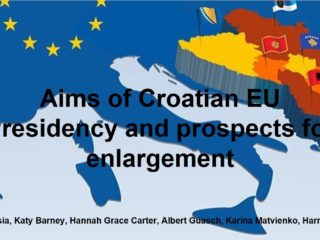 Starting with discussions and reflections (“lessons learnt”) on previous rounds of EU enlargement and the role of EU presidencies in general, the group then deliberated the four official aims of Croatian’s EU Presidency: A Europe that develops, a Europe that connects, a Europe that protects, an influential Europe.
Starting with discussions and reflections (“lessons learnt”) on previous rounds of EU enlargement and the role of EU presidencies in general, the group then deliberated the four official aims of Croatian’s EU Presidency: A Europe that develops, a Europe that connects, a Europe that protects, an influential Europe.
It was accepted and welcomed that these general ambitions can only be achieved with the help of Croatia and the Western Balkans. It was noted that Croatia certainly aims to be a role model for the region. Group discussions took inspiration from Ursula von der Leyen, who had stated in her Europe Addess on 10th November, 2019: It is in our interest for the Western Balkans to have a European perspective. We share the same continent, the same history, the same culture and the same challenges. We have asked a lot of North Macedonia and Albania and they have delivered – now we must keep our word and start accession talks.”
The group structured debates around distinct categories:
A: Principles and policy approach
– A timed and staged approach to integration of the Western Balkans (achieving a EU of 33 members by 2033) was preferred over a big bang accession.
– The group recommended to convince current EU states that vetoing further integration for internal gains is counterproductive.
– The EU needs to focus on treaty reform to strengthen its institutional framework, avoiding a substantial change in its enlargement policy.
– Delaying integration obliges the European Union to be involved in the region through other instruments and a larger special budget for the Western Balkans.
– The group advised that EU should continue to leverage its soft power in the region, focusing less on border disputes and more in easing ethnic tensions.
B: Values
The group stressed that policy action and instruments should be guided by overriding values that are non-negotiable. These include:
Democracy
● Maintaining and promoting democratic values and systems
● Understanding and accounting for the fact that democracy is a pluralistic concept.
Education
● Public
● Diplomacy/Soft Power/Bilateral Educational Programmes
● Transitional Justice and reconciliation
● Bottom up/ top-down approaches
Independent Media
● Independent from the State
● Plurality of views
Human Rights
● Ensuring and safeguarding fundamental human rights of the European Court of Human Rights
● Promoting non-discrimination rights eg. LGBTQ+ and disability, ethnic minority rights and cultural diversity
C: A new strategy and a new order?
The group finally debated whether the EU needs a totally different enlargement strategy and time sequence and/or a new order for the region as a whole. The accepted sequence of envisaged enlargement is currently: 1) Montenegro, 2) Serbia, 3) Macedonia, 4) Albania, 5) Bosnia&Hercegowina, 6) Kosovo.
However, a stronger and more concrete message could be sent to the region by adapting a revised process – allowing countries to ‘jump the queue’ if they demonstrate progress, whether within a new methodology for assessing progress or the old and proven one.
Specific country recommendations included:
● Montenegro: Set to open the final chapters – continue to close the already opened chapters
● Serbia: Warning that backsliding will lead to relegation, rather than just ‘staying in the waiting room’.
● North Macedonia: There should be no loss of energy despite November’s setback.
● Albanania: Continuing progress on priority issues such as organised crime and judiciary.
Group 2: Quality of democracy in SEE: the role of rule of law and civil society
Participants: Aleksandra Popova, Bulgaria; Adnan Tatar, Bosnia & Herzegovina; Visar Xhambazi, Kosovo
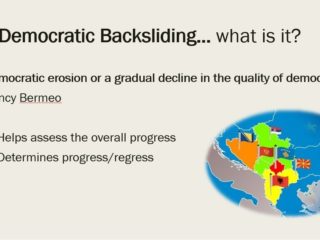 The group focused on democratic backsliding, a term which can be helpful to determine the overall progress or regress of democracy; however, it can also be controversial. When you apply the term “democratic backsliding” to a particular region, it can be problematic and creates generalizations that are not necessarily applicable to all countries, the group asserted. For instance, Kosovo is progressing according to the Reporters without Borders’ Media Freedoms Index while Serbia is regressing quite badly. Thus, when talking about regional democratic backsliding it is very important to be specific rather than portray a region as a single unite. In conclusion, democratic backsliding is a serious problem facing the Western Balkans; but countries have different problems and for different problems there must be different approaches.
The group focused on democratic backsliding, a term which can be helpful to determine the overall progress or regress of democracy; however, it can also be controversial. When you apply the term “democratic backsliding” to a particular region, it can be problematic and creates generalizations that are not necessarily applicable to all countries, the group asserted. For instance, Kosovo is progressing according to the Reporters without Borders’ Media Freedoms Index while Serbia is regressing quite badly. Thus, when talking about regional democratic backsliding it is very important to be specific rather than portray a region as a single unite. In conclusion, democratic backsliding is a serious problem facing the Western Balkans; but countries have different problems and for different problems there must be different approaches.
Media freedom in the region: According to an article of Reuters, more than a third of all media violations in Europe in the period 2018 – 2019 occurred in Southeast Europe. Moreover, in half of the cases the governments were behind them.
Considering the annual report of the World Press Freedom Index the countries from the Western Balkans are taking the last positions. Across the region it is a common practice to harass and intimidate journalists, which are trying to simply do their job. Some of the problems the countries are facing relate to the media ownership concentration, lack of pluralism in the print and broadcast media, absent media literacy and so on. The media environment could become better by organising training programs to improve quality and professionalism of journalism, supporting national reforms in broadcasting, monitoring media freedom regularly, and documenting cases of media rights violations.
The group also presented the ranking of the ‘Doing Business in the world index’ to connect economic prospects for investment and business with the quality of democracy.
Group 3: Security and geopolitical challenges
Participants: Ivo Bochev, Bulgaria; Elisabetta Crevatin, Italy; Armando Guçe, Albania; Tatiana Valyaeva, Germany; Khrystyna Parandii, Ukraine
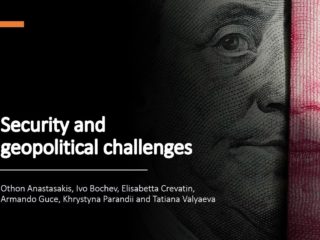 The group discussed some important geopolitical challenges in the Western Balkans in the context of ‘geopolitics of fear’ versus ‘geopolitics of hope”. The former refers to the understanding of challenges as threats while the latter sees them as opportunities for the future. Among the many challenges in the region, the group focused on what it considered as the most important including: geo-economics; migration; malign influences in the form of cybersecurity and misinformation; and organised crime.
The group discussed some important geopolitical challenges in the Western Balkans in the context of ‘geopolitics of fear’ versus ‘geopolitics of hope”. The former refers to the understanding of challenges as threats while the latter sees them as opportunities for the future. Among the many challenges in the region, the group focused on what it considered as the most important including: geo-economics; migration; malign influences in the form of cybersecurity and misinformation; and organised crime.
Geo-economics: This first challenge looks at the importance of energy, FDI, infrastructure and the influence of Russia, the role of China through its Silk and Road Initiative and the potential geopolitical influence of external actors through the use of economic means. While geo-economics can be perceived as threats in terms of creating dependencies of the Western Balkan states on external actors, there can be many opportunities and synergies if such influences of third actors are undertaken in the context of the EU rules and procedures and the WTO.
Migration: The region is a transit route for migrants on their way to the EU. The group focused on how the securitisation of migration overlooks humanitarian concerns, it has a negative impact on the country’s domestic resources and leads to the rise of populism and nationalism. What these countries need to overturn the fears of migration are financial support, information exchange, better mechanisms of integration of refugees and fairer burden sharing in Europe.
Malign influences: External players are unlikely to start conventional aggression in the region, they revert to using much ‘softer’ tactics to achieve their ends. Malign influences hence encompass disinformation, manipulation of information on social and traditional media, cyber threats and covert operations. Russia is the most conspicuous in this regard, as its efforts are directed at undermining transatlantic agenda in the Western Balkans, as well as at exacerbating existing tensions between those countries. At the same time, Turkey and the Gulf states also exert political and cultural influence by different means, while China is trying to shape the public opinion for the sake of advancing its business interests.
According to the group, there are several ways how Western Balkan countries can become more resilient against such malign influences, and the EU has a major role to play in this process:
1. The EU should remain committed to the enlargement policy and invest more effort into its strategic communication and public diplomacy in the region, to reinforce the progress of European integration for Western Balkans countries.
2. Malign influences cannot be countered without strong and effective democratic institutions, as well as sound and active civil society. This would require a whole-of-the-government approach to strengthening societal resilience in the Western Balkans, and hence, the Western support of democratic reforms (along with stringent conditionality in this area) is absolutely crucial.
3. On a more operational level, independent media with high standards of journalism are instrumental in this regard. The EU can help local media to develop their fact-based reporting with enhanced EU support programmes and trainings.
Organised crime: A major security issue for the region of the Western Balkans is organized crime groups (OCG) which managed to connect with international cartels operating in various fields including drug, human, and arm trafficking.
The power and the money that these groups have gained throughout the years have eventually led to them being more attractive to the governments of the region. The case of Albania is a representative example of how these groups are overshadowing the power of EU or FDIs. The dangers that this attractiveness has created for Albania are expressed via corruptive schemes of vote buying for political parties/representatives that will forward the interest of the OCGs which are mainly money laundering that are achieved via questionable Public Private Partnerships (something that the Albanian government has been continuously criticized by both domestic and foreign agencies).
The group concluded by the following recommendation to address geopolitical challenges:
● Need for strengthening perception and reality of EU presence in the Western Balkans
● The West should be speaking with a single voice to the Western Balkan EU hopefuls
● Need for stronger European defence and security mechanisms to which the region should be a firm part of.
Group 4: Regional demographics and brain drain
Participants: Zlatko Galesic, Croatia; Nikola Stojisavljevic, Serbia; Andrea Utz, Germany; Sarah Schneider-Alia, Germany
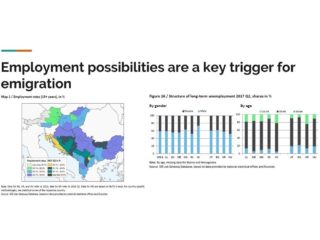 Regional brain drain is one of the biggest challenges for the future of the Western Balkan region. Through emigration of the (predominantly) young, well-educated and politically more liberal parts of society the region is losing development potential in human skills; a demographic loss with negative effects on a country’s competitiveness and growth potential and huge political consequences for EU integration. These effects are at least partially balanced by significant annual remittances that the diaspora is sending back home. Over 70 % of skilled workers leave their home country toward Western Europe. Reasons are:
Regional brain drain is one of the biggest challenges for the future of the Western Balkan region. Through emigration of the (predominantly) young, well-educated and politically more liberal parts of society the region is losing development potential in human skills; a demographic loss with negative effects on a country’s competitiveness and growth potential and huge political consequences for EU integration. These effects are at least partially balanced by significant annual remittances that the diaspora is sending back home. Over 70 % of skilled workers leave their home country toward Western Europe. Reasons are:
● Long-term unemployment
● Earn more money (which can be sent home)/higher living standard
● Work in the area they studied
● Employment offer abroad (get responsibility)
● Culture of migration (family and society sees that as success)
● Urbanization
● Dysfunction of government/policies
● Desire for “Western” culture
● General insecurity
● Family reunification with members already abroad
Employment possibilities are a key trigger for migration. That also means that national education expenses for the emigrants are lost investments (e.g. Euro 150k per medical student) if those never return.
But there are also positive effects of emigration for countries:
● Lower unemployment rates
● Lower social welfare expenses
● Increased human capital with return migrants
● Remittances (investments, support family)
● Votes tend to be more in favour of incumbant government
According to the working group, all this is not inevitable. Political will and a clear strategy can change the game:
The EU and each individual country e.g. could enable:
● Support for grant applications to facilitate start-ups (i.e. accessible to citizens)
● Create Innovation funds
● Promote exchange programs (both ways) → promote awareness
● Quotas on skilled immigrants per country (e.g. Switzerland)
Proposals:
● Strengthen democracy
● Create a strategy for regional development (decentralization)
● Lower tax rates for certain cities, which should be developed
● Establish a fellowship program
● Start an educational campaign
● Improve business education across all levels
● Initiate co-working spaces to facility a start-up scene
CONCLUSION:
All participants realised that the Western Balkan region and Europe’s approach to it will shape the political and economic prospects of our continent. The region will remain a contested space, be it over external geo-economic influence or internal debate on varieties of democracy and market economies. Even though there was already a remarkable knowledge about the region among the carefully selected high-level participants, the two days of discussion certainly deepened understanding of and fondness for the Western Balkans.
Despite being overshadowed by the emerging Corona-Crises, the seminar proved to be a great success. The Young Professionals from United Europe and the students from the EUROPAEUM developed a quick bond and worked constructively together by addressing a large range of topics within a short period of time. The spirit of the seminar was remarkable, friendships developed, and debates will continue in various fora for some time to come.
We sincerely thank the speakers and our cooperation partner THE EUROPAEUM for their commitment and the Croatian Chamber of Economy and the Croatian Ministry of Foreign and European Affairs for their kind support!



